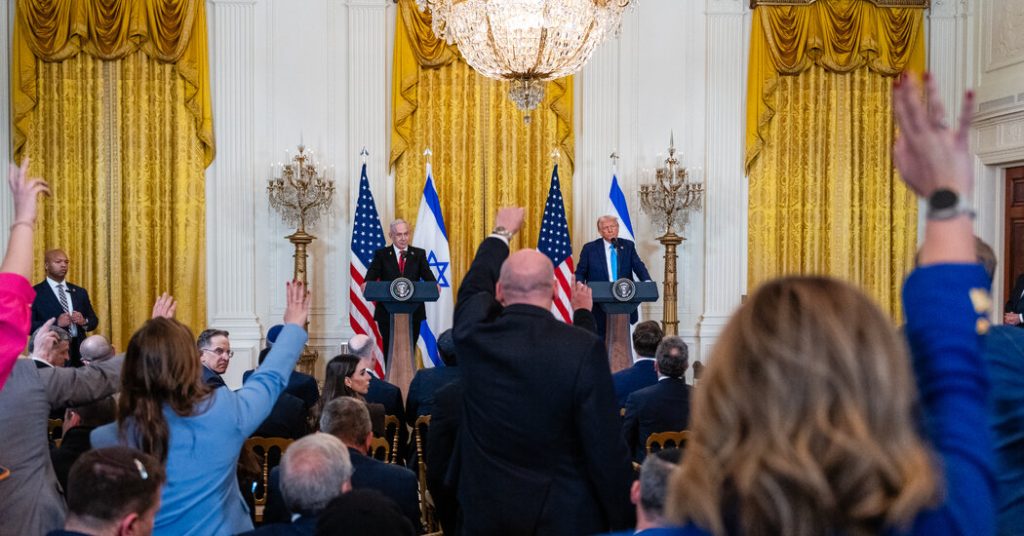President Trump touted the 2020 Abraham Accords that established formal ties between Israel and four Arab countries as one of the biggest foreign policy achievements of his first term.
Now he is pursuing his long-desired goal of getting Saudi Arabia to join the accords — but he may have just dealt himself a serious setback. Mr. Trump’s proposal to transfer all two million Palestinians out of the Gaza Strip and then rebuild the enclave as the “Riviera of the Middle East” has antagonized some of the very people he needs to seal the deal.
The Gaza idea was swiftly rejected by Arab countries, among them Saudi Arabia. The Gulf powerhouse released a pre-dawn statement right after Mr. Trump floated the proposal on Tuesday evening alongside Prime Minister Benjamin Netanyahu of Israel in Washington.
The kingdom made clear that it is standing by its demand that a Palestinian state first be established before it will normalize relations with Israel. The precondition, which the Saudis have insisted on for the past year, is “nonnegotiable and not subject to compromises,” the Foreign Ministry said in a statement on Wednesday.
The statement directly contradicted Mr. Trump, who had just told reporters in Washington that Saudi Arabia had dropped the precondition. One senior Saudi royal said what the American leader was proposing would be tantamount to an “ethnic cleansing” of Gaza.
By proposing to “clean out” Gaza, Mr. Trump has earned little but suspicion and anger in Arab countries. Efforts by the American administration to soften the stance, with Secretary of State Marco Rubio suggesting that Gazans would be relocated only temporarily, have done little to mollify them.
The issue of Palestinian statehood is at the heart of the controversy over Mr. Trump’s Gaza proposal. For many Arabs, displacing Palestinians is anathema because it would shred their hopes for an independent state.
Egypt and Jordan, the countries Mr. Trump has suggested could be persuaded to take in Gazans, have publicly remained adamant that they would never accept a mass displacement of Palestinians. Officials, journalists and analysts in both countries said history spoke for itself: When Palestinians have been forced from their homes, they have not been allowed back.
Since the war in Gaza, both countries have been taking in Palestinians in need of medical attention. Egypt has accepted at least 100,000 medical evacuees and others who fled the neighboring enclave. Jordan, much of whose population is of Palestinian descent, is treating dozens of injured people from Gaza.
But participating in any forcible or permanent displacement of Palestinians from Gaza would be “morally and legally horrifying,” said Abdel Monem Saied Aly, a pro-government Egyptian political analyst and columnist.
Given the Saudi population’s broad support for the Palestinians, it would be difficult for the government to accept any agreement that does not address their aspirations for statehood. Public outrage in the kingdom over the war, and now over Mr. Trump’s proposal to empty Gaza, has complicated the prospects of a deal with Israel that was already going to be difficult to pull off.
Before Mr. Trump took office for his second term, there was some cause for modest optimism that Saudi-Israel normalization might move forward. A cease-fire between Israel and the Palestinian militant group Hamas was reached on the eve of Mr. Trump’s Jan. 20 inauguration. And the new American president has for years fostered a good working relationship with Crown Prince Mohammed bin Salman, the de facto ruler of Saudi Arabia.
But now, some strains seem to be emerging in that relationship.
Prince Turki al-Faisal, Saudi Arabia’s former spy chief and former ambassador to the United States, told CNN on Wednesday that Mr. Trump “will get an earful from the leadership here” not only about the lack of wisdom in what he is proposing but also the injustice of “ethnic cleansing.”
As if to underscore his point, he wore a Palestinian black-and-white checked kaffiyeh in lieu of his traditional white headdress.
The four Arab governments that signed the Abraham Accords — the United Arab Emirates, Bahrain, Morocco and Sudan — did so despite criticisms that they were giving up on what had for decades been the Arab precondition for any ties with Israel, the establishment of a Palestinian state.
When Bahrain and the Emirates became the first two nations to sign the agreements, the president of the Palestinian Authority, Mahmoud Abbas, called it “a stab in the back of the Palestinian people.” Mr. Abbas governs parts of the Israeli-occupied West Bank.
After 15 months of war in Gaza, outraged Arab publics are unlikely to accept any similar compromises now and the Israeli government led by Mr. Netanyahu firmly opposes Palestinian statehood.
“If normalization with Saudi Arabia depends on progress toward a Palestinian state even by a millimeter, it won’t happen. Period,” Israeli Finance Minister Bezalel Smotrich was quoted as saying by Israel’s army radio last month.
The Saudis sat out the historic signing of the Abraham Accords, but when the deal expanded to include Morocco and Sudan, the Saudi crown prince called Israel a “potential ally” in a 2022 interview with The Atlantic.
In September 2023, the crown prince became the first leader of the kingdom to openly discuss the possibility of establishing relations with Israel in exchange for a defense pact with the United States and help with developing a civilian nuclear program. He did not mention Palestinian statehood as a condition.
In an interview with Fox News at that time, the crown prince said such an agreement would require “a good life for the Palestinians.” The indications back then pointed to the possibility that Saudi Arabia, too, might be willing to scale back its insistence on a Palestinian state before forging ties with Israel.
Then came the Hamas-led attack on Israel on Oct. 7, 2023, which killed about 1,200 people. The 15-month Israeli military campaign that followed killed more than 46,000 people in Gaza, according to local health officials, who do not distinguish between civilians and combatants. The war devastated the densely populated and impoverished territory.
Since the war, the Saudi government has shifted its tone, saying that the region needs to be on an irreversible path to statehood for the Palestinians.
“We do have some red lines,” Prince Khalid bin Bandar, the Saudi ambassador to the United Kingdom, said late last month. “And for us to end the last 75 years of pain and suffering caused by one problem has to include a Palestinian state.”
It is possible that both Mr. Trump and the Saudi leadership are laying out maximalist positions as starting points in a negotiation, and will shift at some point to reach a compromise.
Many people in the four countries that normalized ties with Israel have been horrified by the war in Gaza and have publicly protested the accord. While freedom of association and assembly remain highly restricted in Bahrain, the government allowed the protests.
Though Egypt and Jordan have had peace treaties with the Israelis for decades, their publics never warmed to Israel, and ties have been severely strained by the war.
Egyptian officials told foreign diplomats in Cairo this week that their rejection of Gazan displacement was unwavering. In public, they reiterated that Egypt was focused on putting the cease-fire agreement into effect and delivering humanitarian aid to the Palestinians there.
Egypt “affirms its complete rejection of any proposal or concept aimed at eliminating the Palestinian cause through uprooting or displacing from their historic homeland and its seizure, whether on a temporary or permanent basis,” Egypt’s Foreign Ministry said in a statement on Thursday.
Political analysts close to the governments in Egypt and Jordan suggested that the two countries’ leaders would try to persuade Mr. Trump to accept an alternative plan for Gaza’s recovery involving aid and assistance from their countries as Gaza.
“Egypt and Jordan have been historically engaged in the Palestinian cause, and they have to be an integral part of any solution,” said Khaled Okasha, director of the Egyptian Center for Thought and Strategic Studies, a government-aligned think tank. “But not the one that Trump is suggesting.”
Fatima AbdulKarim contributed reporting from Ramallah, in the West Bank.







